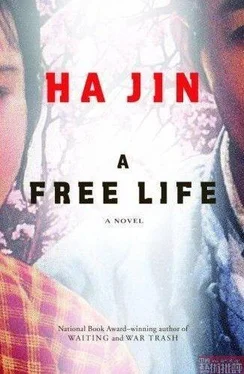"He could be. I've noticed that in the math class he doesn't go to the bathroom as often."
"I work hard with his reading at home," Pingping said.
"I can tell. He has made a lot of progress. Still, it's not easy for him to keep up with the rest of the class. That's why I want to ask you this-would you like to have him placed in a bilingual class? The school is going to start one soon."
"No!" Nan objected. "We don't want him to be in a class jahst for foreigners."
"Yes, he doesn't need that," Pingping chimed in. Mrs. Gardener looked perplexed. "Why? That'll make him more comfortable."
"He comes here to stahdy, not to be comfortable," replied Nan.
"I don't understand, Mr. Wu, although I appreciate your taking his education so seriously."
"He can catch up wiz zer class, believe me. Please give him a chance," Nan said.
"Please don't get rid of him!" Pingping begged. "Taotao said a lotta good thing about you, Mrs. Gardener. He's unhappy if you take him out."
The teacher looked at her in astonishment, then was all smiles. "I don't mean to send him away. Don't get me wrong. If you insist, we won't put him in the bilingual class."
After that meeting, Pingping worked harder to help Taotao with his reading. Every week she borrowed a dozen or so children's books from the town library and read them together with him. Even when the boy was too tired to continue, she'd go on reading aloud so he could listen while working a jigsaw puzzle or playing with Legos or the toy robots Nathan had lent him. She didn't always understand what she read. Once, as mother and son were reading a story about
King William and his knights who conquered a fortress, the boy asked, "Mama, what does 'laid waste' mean?"
"Poop and pee everywhere." She then continued loudly, "The king was pleased with the raid and awarded his men…"
Another time they were reading an abridged biography of Queen Elizabeth. When they came to a scene in which Her Majesty was so furious with a courtier that she laid her hands on him, Taotao asked his mother, "What is 'boxed his ears'?"
"To cover up his earholes so he couldn't hear anything."
"It doesn't sound like that."
"All right, let's mark this and ask Daddy when he's back."
Among the titles Pingping had checked out of the library, she liked the simplified Black Beauty best. She'd sigh, saying, "I'm like that horse, always moving from place to place and serving others. As long as the harness is on me, I can't take a run for joy or lie down for weariness. I have to work, work, work, until I die." Her eyes would fill.
Taotao didn't fully understand what she meant, but her words upset Nan when he overheard her. He knew her life had been misspent. When Pingping was a child, her mother had prophesied her hard future, saying she had a princess's body but a maid's fate. Pingping resented that but never dared to talk back. She always dreamed of becoming a doctor like her parents and often went to her father's clinic to do voluntary work, giving injections, decocting medicinal herbs, performing acupuncture and cupping, boiling syringes and needles. Everybody praised her, many patients wanted her to treat them, and people believed she had life-nurturing hands and would make an excellent doctor someday. But when she had grown up, she couldn't even attend nursing school and was assigned to study applied mathematics in a technical school. How she envied those youths in her neighborhood who had gone to college or the army through their parents' clout. In her mind she had blamed her father for not pulling strings for her, even though she knew that the old man, born into a rich peasant's family and classified as a reactionary element, dared not, and could not, assert himself. Now she made Taotao study hard, hoping he could go to medical school someday. If that happened, she would spend her last penny helping him.
IN EARLY NOVEMBER, the Masefields left for Italy to visit Heidi's sister, Rosalind, who lived in Rome most of the time. Seizing the opportunity, Nan invited Danning and three other friends over for dinner. But except for Danning they all declined, saying they were too busy. True enough, two of them had to work the graveyard shift at the Chinese Information Center in Newton that had been established recently by a group of dissidents to help the underground democracy movement in China. But it was also true that since Nan had quit graduate school, most of his friends had distanced themselves from him. They probably viewed him as a loser. Pingping urged him to break with them completely. "They're just a bunch of fair-weather snobs, not your friends," she told Nan. "Who needs them?"
Danning, however, was always eager to visit the Wus. He was almost thirty-five and had a seven-year-old daughter back in China. His wife had joined him in the United States two years before but had left him last winter. They had often quarreled, and she'd yell at him, calling him names and saying that one of these days she would quit being his "pretty slave." She liked bragging about her looks, which were by no means extraordinary; she merely sported a pair of sparkling eyes shaded by long lashes. Her nose was flat, her mouth wide, and one side of her face larger than the other. She told people that she had grown up always with a nanny for herself and had never cooked a single meal back home when she lived with her parents, but now she did all kinds of housework that made her feel humiliated. One night as she and Danning fought again, she grabbed a kitchen knife and swiped at him. "Ow!" he cried, feeling the pain in his back. At the sight of blood she dropped the knife and ran away. Their roommate, who shared the three-bedroom apartment with them, drove him to the hospital, where Danning received twelve stitches. His wife didn't come back after a few days, so he reported it to the police-not his wound, but her disappearance. She was nowhere to be found, though some people said they had seen her shopping at Ming's Supermarket in Chinatown. It was whispered that she was living with a wealthy businessman from Canton now. Although Pingping didn't like Danning's wife that much, she never blamed her. She'd say to Nan, "Why couldn't Danning see that Anni meant to leave him? He always bragged about this and that but never saw the fire in his backyard."
"Come on, have some sympathy," Nan would object. "He's a smart man. How can we tell he wasn't aware of his marital trouble?"
"I hope he can find her."
The truth was that Danning still didn't know her whereabouts. She hadn't written him a word and had never called. Oddly enough, he seemed to enjoy living as a bachelor, in no hurry to look for her. Their daughter was cared for by his parents back in Beijing.
Before dinner, Nan gave his guest a tour of the Masefields' place. He took Danning to the tennis court, its green surface studded with yellow balls; the frayed net was slack, betraying that nobody had played here recently. Next they went to the swimming pool beyond the tennis fence, the water wrinkling in the breeze and a pair of white plastic geese bobbing in a corner, their necks tethered to a steel pipe by ropes. Then Nan and Danning entered the workshop next to the garage, in which Heidi made pottery. The room had in it a hardwood floor, a ceiling fan, a tall electric heater, and a long workbench on which were stacked some terra-cotta pots. Near the window stood a potter's wheel and a side chair. A column of sunlight slanted in, specks of dust billowing in it. Danning was so impressed that he said, "This makes me sad, very sad."
"Why?" Nan was surprised.
" We all work so hard, but how could we ever get as rich as this family?"
"Heidi owns half a bank and an insurance company. Old New England money. We shouldn't measure ourselves against her."
Danning sighed. "We'll never live like this. What's the good of working myself to a skeleton here?"
Читать дальше












